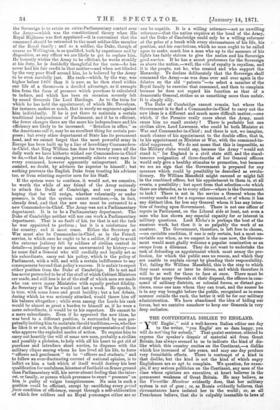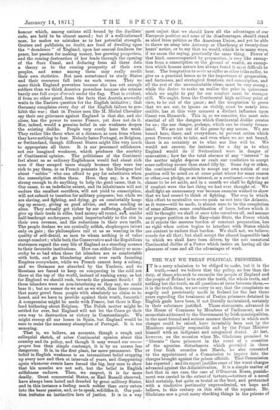THE CONTINENTAL DISLIKE TO ENGLAND.
" yOU Englis'," said a well-known Italian editor one day to the writer, "you Englis' are so dam happy, you will do not'ting for nobody." That quaint sentence, uttered to express the speaker's despair of material aid from Great Britain, has always seemed to us to indicate tho kind of dis- like which this country excites on the Continent,—a dislike which has increased of late years, and may one day produce very • formidable effects. There is contempt of a kind in that dislike, but the kind is not the kind of which angry Englishmen are so apt to complain. We question, for exam- ple, if any serious politician on the Continent, any man of the class whose opinions are executive, at heart believes in the permanent weakness of Great Britain. He may believe, as the Versailles Moniteur evidently does, that her military system is out of gear ; or, as Russia evidently believes, that circumstances have isolated her in the world ; or, as all. Frenchmen believe, that she is culpably insensible to laws of honour which, among nations still bound by the duellists' code, are held to be almost sacred ; but if a well-informed man, he makes no mistakes as to her potential strength. Orators and publicists, no doubt, are fond of dwelling upon the " decadence " of England, upon her sensual fondness for peace, her passion for making money, her growing pauperism, and the coming destruction of her trade through the opening of the Suez Canal, and deducing from all these data a theory as to the coming prosperity of their own peoples, and some among them may really credit their own statistics. But men accustomed to study States and their resources fall into no such errors. They no more think England powerless because she has not enough soldiers than we think America powerless because she retains barely one full corps d'arme'e under the flag. That is evident, if from no other proof, from the facts that Austria avowedly waits in the Eastern question for the English initiative ; that Germany complains every day of the English failure to pro- hibit the war ; that in France men like M. Michel Chevalier say their one grievance against England is that she, and she alone, has the power to rescue France, yet does not do it. Nor, indeed, would a genuine belief in our weakness deepen the existing dislike. People very rarely hate the weak. They rather like them when at a distance, as men from whom they have nothing to fear. Nobody hates Portugal, or Belgium, or Switzerland, though different States might like very much to appropriate all three. It is our presumed selfishness, not our imagined weakness, which produces the acerbity of Continental opinion. The politicians of the Continent feel about us as ordinary Englishmen would feel about rich men if they escaped taxes simply because they were too rich to pay them, or as French peasants in the Dordogne feel about " nobles " who can afford to pay for substitutes when the conscription strikes them. Here, they say, is a State strong enough to do anything to help the good cause, that is, Our cause, to an indefinite extent, and its inhabitants will not endure the smallest sacrifices, will not yield to conscription, will not submit to taxation for military purposes; but while we are slaving, and fighting, and dying, go on comfortably heap- ing up money, giving us good advice, and even sending us alms. They actually get richer by our sufferings, decline to give up their trade in rifles, lend money all round, ail, amidst half-bankrupt exchequers, point imperturbably to the rise in their own revenue, and the reductions in their own tariffs. The people declare we are cynically selfish, shopkeepers intent only on gain ; the philosophers rail at us as wanting in the quality of self-denial, as men to whom nothing is of value except comfort ; while both the Conservative and the Republican statesmen regard the easy life of England as a standing menace to their favourite institutions. How can either liberty or mon- archy be so bad when these fat islanders are so comfortable with both, and go blundering about over earth founding Empires everywhere, while we French cannot keep a colony, and we Germans are absorbed by the Yankees, and we Russians are forced to keep on conquering in the cold out there at the top of the world, instead of rushing away, as but for England we should rush, towards the pleasant South ? If these islanders were as non-interfering as they say, we could bear it ; but no sooner do we act as we wish, than there comes that nasty growl from people with absolutely no claim to be heard, and we have to provide against their wrath, forsooth A compromise might be made with France, but there is Eng- land bothering about Belgium. The Polish matter might be settled for ever, but England will not let the Czars go their own way to destruction or victory in Constantinople. We might recoup all our losses in Spain, but England would be sure to resist the necessary absorption of Portugal. It is too annoying.
That is, we believe, an accurate, though a rough and colloquial sketch, of sober Continental opinion about this co entry and its policy, and though it may wound our amour propre less than simple contempt, it is by no means less dangerous. It is, in the first place, far more permanent. The belief in English weakness is an intermittent belief cropping up every now and then at intervals of years, and disappearing again whenever events have forced the big, lazy man to show that his muscles are not soft, but the belief in English selfishness endures. Then, we suspect, it is far more deadly. Great commercial States, as Earl Russell observed, have always been hated and dreaded by great military States, and in this instance a feeling much nobler than envy enters into the baser passion, and, so to speak, solidifies it. Our posi- tion irritates an instinctive love of justice. It is in a way most unjust that we should have all the advantages of our European position and none of its disadvantages, should stand as aloof from politics as the American Union, and yet be able to throw an army into Antwerp or Cherbourg at twenty-four hours' notice, or to say that we would, which is in many ways, if we mean the saying, practically the same thing. Power of that kind, unaccompanied by preparation, is very like exemp- tion from a conscription on the ground of wealth, an exemp- tion which human nature has always found it most difficult to bear. The temptation to make us suffer as other folks suffer, to give us a practical lesson as to the importance of preparation, and fortresses, and strategical frontiers, and conscription, and all the rest of the uncomfortable ideas, must be very strong ; while the desire to make us realize the price in quiescence which we ought to pay for our comfort must be stronger still. We ought, from the Continental high military point of view, to be out of the game ; and the temptation to prove that we are out, to ignore us visibly, must be nearly irre- sistible, has at this very moment a distinct influence upon Count von Bismarck. This is, as we conceive, the most sub- stantial of all the dangers which Continental dislike creates for us ; the one danger, perhaps, which can be clearly formu- lated. We are not out of the game by any means. We are bound here, there, and everywhere, to prevent action which great Powers wish to take, and even when we are not bound, there is no certainty as to what our line will be. We would not answer, for instance, for a day as to what England would do if Switzerland were in danger of annexation ; how far the total absence of any " interest " in the matter might depress or exalt our resolution to accept some suffering sooner than stand idly by. Some day or other, the continental disposition to accept our own notion of our position will be acted on at some point where for some reason or other,—a pledge, or an interest, or a sentiment,—we do not choose to be set aside, and in a month we shall be fighting as if comfort were the last thing we had ever thought of. • We shall fight an unnecessary war because enemies wished to show that we had ceased to think of fighting. The way in which this effort to neutralize us—to push us out into the Atlantic, as it were—will be made, is almost sure to be the completion of some alliance, some combination of force, before which it will be thought we shall at once take ourselves off, and assume our proper position as the Easy-chair State, the Power which as it rejects the onerous burden of constant preparation, has no right when action begins to interfere with States which are content to endure that burden. We shall not, we believe, recede for all that; but shall accept the almost impossible task to which we shall have been driven, by the not unnatural Continental dislike of a Power which insists on having all the pleasures of ease and all the advantages of work.



































 Previous page
Previous page